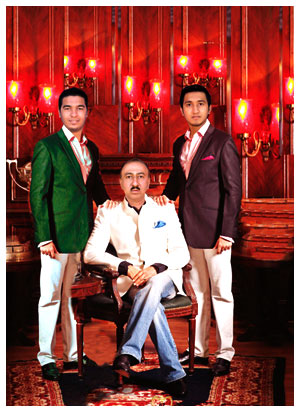
An astute businessman, the new head of the House of Shama knew the importance of courting the connoisseurs of fine things. He drove his workers to further experimentation and innovation, and the Shama range of attars expanded as a consequence. Rabia-ud-Durrani, first wife and chief consort of the Emperor Aurengzeb, was one of Al Tufail's more famous patrons-although by this time Shama attars were being sold in many cities around Agra: Ajmer, Kalinjar, Allahabad, Gwalior, and of course, the new capital of Shahjahanabad, or Old Delhi as it is known today.
After Aurengzeb's death in 1707 the Mughal Empire went into rapid decline. Al Tufail continued to supply perfumes to the lords and ladies of the Mughal court, despite their constantly changing fortunes, but he had already begun to turn his attention to emerging markets south of Agra. When he died in 1713 at the ripe old age of 85, his two sons, Fakhr AL Din Shama and Hudhaifah Shama widened the reach of their exotic creations as their father had desired. Over the next few decades, Shama attars were sold to an array of customers as wide and varied as the range itself: nawabs, military commanders, representatives of the East India Company, and, of course, the Nizams of Hyderabad, who were great patrons of literature, art, architecture, culture, jewellery and rich food.
In 1770, control of the Shama perfumery business was handed over to Imad AL Din Shama, son of Fakhr Al Din. The young entrepreneur, only 20 at the time, but well-groomed by his father and his uncle, continued to expand the family business, adding Mughal Emperor Akbar Shah II and Nawab of Sindh, Mir Fateh Ali Khan Talpur, to his list of illustrious customers. When Imad Al Din died in 1835 his son Khuzaimah Al Shama took over and soon won the patronage of Bahadur Shah II, who acceded to the throne of Delhi two years later. Though the new emperor's kingdom barely extended beyond the Red Fort, he ruled for 20 years. Quite unlike his predecessors, he was ascetic and spiritually inclined, loved teaching and writing Urdu verse, and embraced and supported his Hindu subjects without reservation. The Emperor was a devout Muslim, who did namaaz five times daily. For each namaaz he used a different attar, supplied to him Khuzaimah Al Shama: ooudh, musk-e-amber, ruh gulaab, khus, and mukhullat.
In 1890, Khuzaimah Al Shama passed away at the age of 85. That year, his son Kamal Shah Shama moved the family business from Agra to Bhendi Bazaar, Mumbai, to take advantage of the export opportunities the port city offered. The enterprise, which ran under the name "Shama Brothers - Perfumers", continued to be backed by its own centuries-old research and production centres, strategically located near the botanical wealth of horticultural estates in Agra and Haryana State. Not surprisingly, it continued to expand its attar range as well as its customer base, which by then included many government figures and superstars of the emerging Bollywood film industry.
When Kamal Shah Shama passed on, his son, Mohammed Kamal Shama, took charge of the business and continued to run it successfully until his death, when he was succeeded by his son, Murtuza Mohammed Shama (Lala). By this time, the attar business had grown very competitive with the emergence of new markets and the expansion of traditional ones. Recognising the importance of keeping pace with change, Lala Shama sent his sons, Zaid and Salman, to the Grasse Institute of Perfumery, in Grasse, France, for further studies in perfumery to ensure that the family business kept in step with trends and technologies in the field.
Today, Lala, Zaid and Salman Shama preside over a highly successful attar business, operating out of an extensive showroom offering no less than one thousand perfumes to attar connoisseurs in the Gulf countries, Iraq, South Africa, the UK, the USA, Canada, Pakistan, and of course, India. The sweet smell of success has never been so distinctly defined-for so many centuries.
Our Gallery